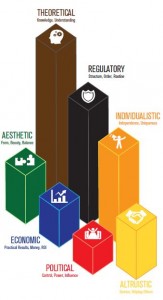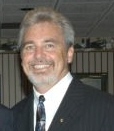Why do you get up and go to work each day?
12.01.2017
The perfect companion assessment to pair with DISC, Motivators measures the seven universal dimensions of motivation that exist within each of us. Where as DISC indicates “How” someone will behave, Motivators tells you “Why”. Being able to measure and understand How and Why someone will behave is vital to indicating the performance of job applicants, optimizing employee performance, building top performing teams, uncovering the source(s) of communicative dysfunction and developing self-aware leaders.
Our Motivators assessment measures seven universal dimensions:
THERORECTICAL: Knowledge, Understanding
REGULATORY: Structure, Order, Routine
INDIVIDUALISTIC: Independence, Uniqueness
ALTRUISTIC: Service, Helping Others
AESTHETIC: Form, Beauty, Balance
ECONOMIC: Practical Results, Money, ROI
POLITICAL: Control, Power, Influence
Would you like to identify the best applicants, optimize employee performance, build top performing teams, uncover the source(s) of communicative dysfunction and develop self-aware leaders?
Get started now on your Team Strength- call 772-210-4499 or email for more information or to set up and an account.
Click here to view the Seven Universal Dimensions.
Vital Tool: Being able to measure and understand How and Why someone will behave.
In my career, I have experienced very different work “cultures”:
In one company”culture”, education was not highly regarded. I was informed not to use my “doctoral title” because it might embarrass fellow employees and the company’s customers. In another company, they insisted I use my professional title, because they thought it would impress the customer base. In a third company, everyone was called by their first name, including the CEO. The “culture” established was one of informality and there was a desire to have a casual and “creative” work environment. There was no written policy about this, it simply was the way people communicated, including the CEO and entire leadership team.
Consider the “culture” of most financial services companies compared to the “culture” of most advertising agencies. There are no written rules about the different “cultures”. They have simply developed over time based on mostly non-verbal behaviors of those in leadership roles
With this understanding in hand, consider the challenges involved in hiring the correct person for a job. To be successful in placing the right candidate in the correct position a hiring manager must look not only for the technical skills of the candidate, but also the personality style and the culture in which the new hire will work.
If a candidate scores highly, for example on the Regulatory motivator, which means they do well in a structured, orderly environment, and your company’s “culture” is very entrepreneurial, shooting from the hip, with little to no formal policies or procedures, this person, though highly skilled, will more than likely not succeed, and will either voluntarily or non-voluntarily leave the company.
Hiring correctly demands much wisdom and skill. Limiting hiring decisions based on looking only at the technical skills of a candidate and perhaps their longevity in a job is often reflected in the company’s turnover rates. The cost of turnover and many times the hidden costs of having the wrong person in the wrong job, and even in the wrong company, can be significant.
Are your hiring managers using the right tools to hire the best people to add to the success of your company?
After making sure a candidate has the requisite technical skills and proper work experience, then the real work of successful hiring begins. Building a hiring tool box using various assessment tools to assure hiring the best person possible.
DISC Personality assessment
Motivators assessment
Cognitive assessment
Emotional IQ assessment
Nothing can “guarantee” hiring the ideal person for the job within your company. However, using all the correct tools can certainly reduce the chance of hiring the wrong person-saving time and money.

 Tim is a Consultant to Business, Government and Not-for-Profits Organizations specializing in innovative and challenging ways for organizations to survive, to thrive and to build their teams.
Tim is a Consultant to Business, Government and Not-for-Profits Organizations specializing in innovative and challenging ways for organizations to survive, to thrive and to build their teams.